
Agility and speed of execution, budget, and lack of skills are the top operational concerns of local CIOs. By far the top effort is spent on aligning IT with business, as it is still largely perceived as a cost centre and a supporter but not a driver of business innovation.
Despite much talk of the pressure to transform in an increasingly digitised world, driving digital strategy is a priority for a mere 1% of CIOs.
These are the headline findings of the inaugural ITWeb Brainstorm CIO Survey, which were revealed at a banquet in Melrose Arch last week.
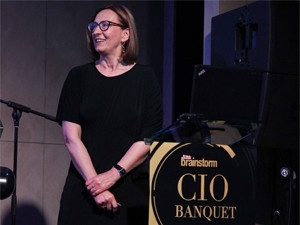
Presenting the results to 400 guests - including participating CIOs, their teams, survey and event sponsors ? Ranka Jovanovic, group editorial director at ITWeb, said the survey was started in association with Telkom Business and is a South African first. Its objective is to track the unique priorities and challenges of South African CIOs, she explained.
In its debut, the survey attracted 158 respondents - boding well for the stated intent to develop it into an annual strategy benchmark report for the local IT sector, says Jovanovic.
Budget squeeze
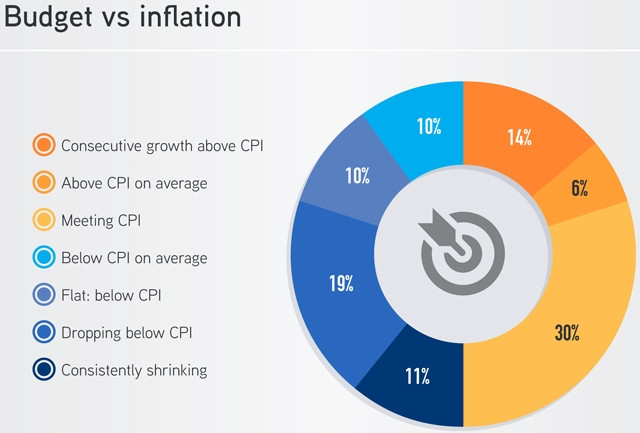
Just over half of the respondents indicate their current, and projected, IT budgets are up or in line with inflation. A closer look at the two-year trend shows only one-fifth are beating inflation and one-third matching inflation, with half of the budgets lagging below the inflation line.
Richard Hurst, senior analyst of enterprise services at Ovum, said CIOs find themselves between a rock and a hard place. "Budgets are under pressure while CIOs are looking to deliver on all these promises."
The survey did not reveal much difference in in-house or outsourced spending patterns, but a marked preference for insourcing was identified in all areas except infrastructure and connectivity. A lot of respondents indicate both insource and outsource strategies for many categories.
Spending is split between keeping the lights on (infrastructure, bandwidth, security) and business development (business intelligence, customer relationship management, analytics).
IT's profile
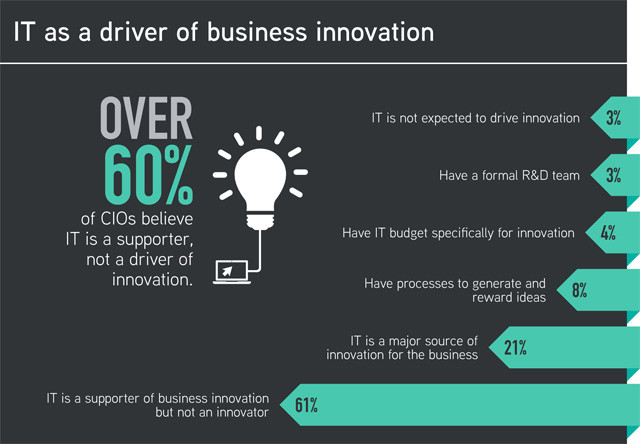
In terms of IT's credibility as a strategic business function, the majority of CIOs (74%) believe IT is perceived as credible. However, "looking at how the CIO's focus is split, more than half are supporting business growth, whole one-third are merely keeping the lights," said Jovanovic. "Astonishingly, only 18% are focused on innovation."
Probing deeper into IT's ability to innovate, the majority of respondents state IT itself is not an innovator but supports business innovation. Only about one-fifth believe IT is a driver of innovation. Very few indicate a formal research and development process or innovation budget.
George Ambler, executive programmes: business development director and executive partner at Gartner, says he was caught by surprise by the innovation finding. "If the CIOs aren't doing it, then who? Globally we know budgets are flat, but my view is that if you're not innovating, I'm not going to give you budget. Budget follows innovation."
What then takes up most of CIOs' time? For nearly half of the CIOs, it is the alignment with business, noted Jovanovic. "We have been hearing about the need for alignment for many years now - one would have thought that was a given by now." IT governance and supporting infrastructure are the next two time-consuming activities on the CIO agenda.
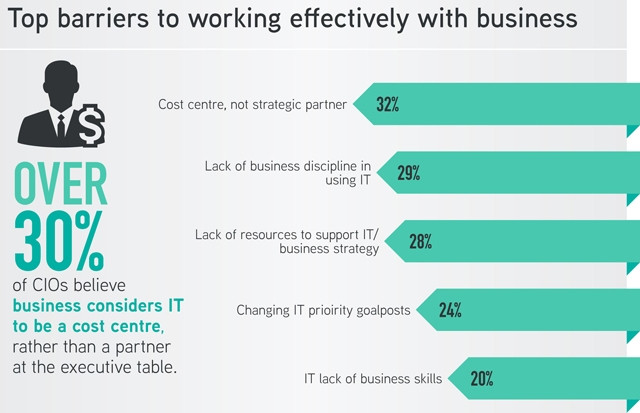
The survey reveals two big issues when it comes to the barriers CIOs face in engaging with business: blaming the business and the lack of budget and resources. "Over 30% of CIOs believe business considers IT to be a cost centre rather than a partner at the executive table. They lack resources and support, and bemoan a lack of business discipline in using IT," commented Jovanovic. A minority acknowledged a lack of business skills in the IT department.
In terms of supporting business, top operational concerns are agility and speed of execution, lack of skills, compliance pressures and squeezed budgets. "Inability to implement IT solutions fast enough was revealed as the top concern for 70% of CIOs, closely followed by lack of skills.
A question of skills
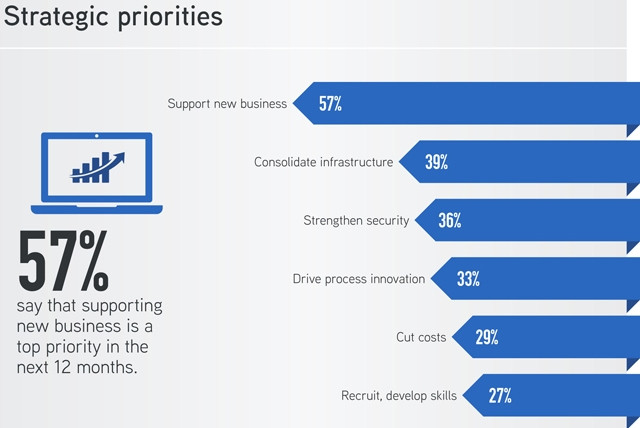
On the one hand, the lack of skills is the second most pressing operational concern; on the other, skills recruitment and development is low on the strategic priority list - trailing these top priority items: support new business, consolidate infrastructure, strengthen security, drive process innovation and cut costs.
The survey also revealed how little CIOs are prioritising skills, and raised the question of whether they are failing to step up.
While relatively few are downsizing on skills ? 43% said they are actively seeking specific skills, while 22% are increasing the use of outsourcing contractors ? only 20% have internship programmes in place.
Mark Walker, regional director, Africa, insights and vertical industries director at IDC MEA, said it is interesting that although skills are important, no one is doing anything about it.
Hurst said the survey results echo the sentiments Ovum is seeing across the globe. "There is an issue of skills, but are we doing the right thing? Are CIOs doing anything meaningful about it?"
Gartner's Ambler agreed, and said although skills are a huge challenge, the survey shows they remain low on the priorities list.
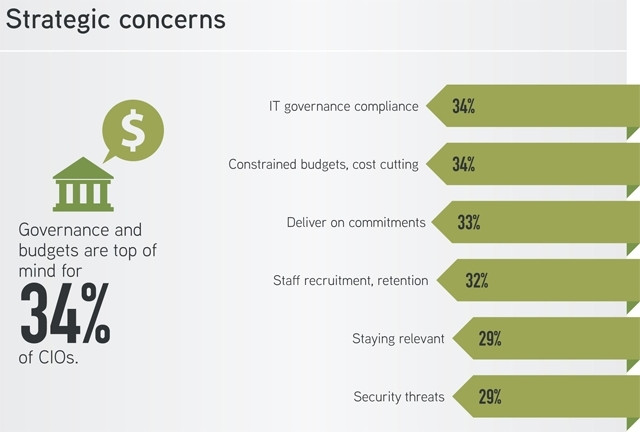
A credible force?
According to Walker, the CIO is uniquely placed. "At the end of the day, it's about trust. The CIO is controlling the game and is the only person with a complete view into the organisation besides the CEO."
CIOs have the pressure of multiple responsibilities, and don't always have time to stop and think, adds Walker. "The industry is changing. We are seeing a lot more consolidation, legacy integration, legacy innovation and more competition. The pressure will be felt by CIOs. The winners will be the ones who use technology the best."
About the survey
The first ITWeb Brainstorm CIO Survey, run in association with Telkom Business, was conducted online on ITWeb from 1 August to 1 September. It focused on operational priorities, business value of IT, sourcing and strategic priorities.
The survey targeted CIOs or equivalent IT executives at corporates and public sector organisations. It attracted 158 participants. About 65% of the response base are large enterprises - employing over 500 people. Half of the participants fall into either financial, government, mining, manufacturing, or ICT.
The full research report based on the survey will be available to respondents free of charge in November, with an executive summary available on ITWeb to all readers by 10 October.
Share